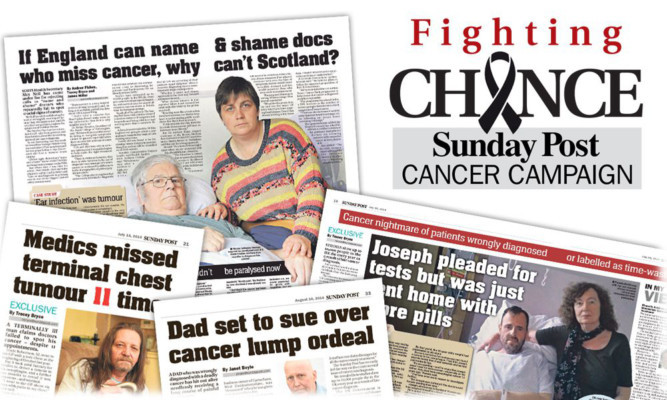
For all sufferers now and in the future, we demand immediate action.
Today The Sunday Post launches a new front in the battle to beat cancer.
Our Fighting Chance Campaign calls for more consistent treatment for cancer patients across the country and faster diagnosis from GPs.Join our campaignRecently, we’ve revealed harrowing cases where patients with cancer were missed.
Despite repeated visits with worrying symptoms, sick patients were often told they were simply suffering from minor illnesses. Only after weeks or even months of appointments, were they referred to a specialist. Tragically, this was often too late.
Today, we reveal how cancer patients who have been referred are facing a postcode lottery over delays to starting treatment, with increasing numbers waiting more than three months. We also tell how some cancers appear to be being given a lower priority than others.
Patients deserve better. We know our GPs and hospitals are under immense pressure and that they are committed to their patients’ health and wellbeing. But thousands of lives are needlessly being lost because of delays in treating cancer and this has to be addressed.
Our campaign calls for some key improvements that we believe will speed up diagnosis and treatment, which is vital if Scotland is to reverse its poor survival rate record.
Six simple steps that could make all the difference.
From today, we are calling for new guidelines to be issued to every GP in Scotland reminding them of the early signs of cancer and how vital it is they identify symptoms straight away.
Our second aim is to persuade the authorities to root out and retrain doctors who repeatedly fail to spot crucial signs of the disease.
Thirdly, we want NHS Boards to increase the number of direct referrals from GPs for hospital scans and tests without seeing a consultant first, to speed up the process.
Our fourth aim is for an expansion of the Detect Cancer Early campaign which reminds Scots of the early signs of the disease. It’s been a huge success in raising awareness of some of the most common cancers and must be rolled out to rarer forms.
Fifthly, we call for a new cancer patient experience survey in Scotland to gauge progress on diagnosis and treatment and drive improvements.
Finally, we’d like to see a steady improvement in the percentage of cancers which are diagnosed and treated at an early stage.
Studies show that in some countries people suspected of having cancer are sent to a specialist straight away and that has to be the ultimate goal.
If these vital but relatively straightforward steps are adopted by the Scottish Government and by medics, cases like those we have highlighted will become a thing of the past.
We’re not asking for a miracle cure or even millions of pounds of funding just some basic improvements. Our drive to improve patient care is already supported by cancer charities.
Elspeth Atkinson, of Macmillan Cancer Support in Scotland, said: “Early diagnosis and treatment creates the best outcomes for cancer patients. The earlier people are diagnosed, the sooner they can be treated and the better their longer-term survival.
“The Scottish Government’s Detect Cancer Early programme raises awareness of the national cancer screening programmes and the early signs of cancer to encourage people to seek help early. GPs clearly need more support to improve the referral process and access resources to help spot cancer signs.”
In response to our campaign, the Scottish Government said detecting cancer early is an “absolute priority” with £30 million already invested and more men and women coming forward to check out potential symptoms.
And it says it is committed to informing GPs about the latest cancer guidelines.
Last week bosses at charity Cancer Research UK, who also support our campaign, announced the number of Scots surviving breast, bowel, lung and prostate cancer has soared during the last 20 years due to earlier detection and better treatment.
This shows what can be done.
But mortality rates for liver, pancreatic, melanoma, oral and some digestive cancers have all increased.
We want to see evidence that patients going to their GP with less obvious symptoms, and less common cancers, will not be misdiagnosed. We also hope to save more cancer patients from delays to treatment that can prove fatal.
Now it’s up to ministers to take on board our calls, for the sake of future cancer patients across Scotland.

Enjoy the convenience of having The Sunday Post delivered as a digital ePaper straight to your smartphone, tablet or computer.
Subscribe for only £5.49 a month and enjoy all the benefits of the printed paper as a digital replica.
Subscribe